Gaming Benchmarks - Direct3D
There are an incredible number of tests we wanted to run in order to explore all the different aspects of gaming on Vista versus gaming on XP both in 32- and 64-bit modes. For this first look, however, we will be sticking with single card setups on Vista x86, Vista x64, and Windows XP x86. In the future, we plan on looking at multi-GPU performance as well as the performance of games on Windows XP x64. With Vista, Microsoft has improved the gaming on 64-bit landscape significantly, and we would like to see just how far we have come.
For now, we will be looking at a selection of cards from AMD and NVIDIA: five cards from the Radeon X1K series and five cards from the GeForce 7 series, as well as both current 8800 parts. These tests will look at GPU and CPU limited situations, and we will be comparing Vista x86 with Windows XP as well as Vista x64 to see where there are any differences. We will also look at resolution scaling on each of our three test operating systems, but only with two cards representing AMD and NVIDIA: the X1950 XTX and 8800 GTX.
In terms of APIs, one DirectX and one OpenGL game will be tested. Oblivion will represent the MS API, while Quake 4 will be showing off OpenGL performance on Vista. We have also taken a look at a native 64-bit game. Valve's Half-Life 2: Lost Coast will be run on all three operating systems in native mode. We would like to have compared HL2:LC running in WoW at 32-bit under x64, but we have not been able to figure out how to test it without running in 64-bit mode yet.
First up is Oblivion performance. DirectX performance should be as close as possible to Windows XP performance as this is Microsoft's baby. First, let's take a look at Vista x86 numbers divided by Windows XP scores for CPU limited and GPU limited cases. This will give us the speed up (numbers above one) or slow down (numbers less than one) as compared to Windows XP. Just remember that there is some normal fluctuation in performance on both sides, so we could see a wider margin of error here than in our standard comparisons.
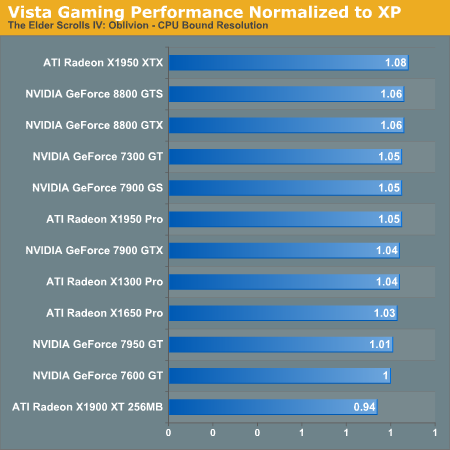
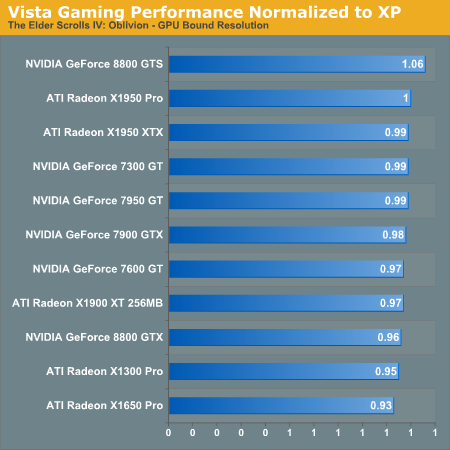
For CPU bound tests, almost every card performs better under Windows Vista than under Windows XP; the lone exception is the X1900 XT 256MB. This indicates that Vista is better able to provide system resources to DirectX games, which is actually quite surprising considering the overhead that Vista adds to the system.
When we take a look at the GPU bound case, we see almost the opposite with only the 8800 GTS performing better than it does on Windows XP. This does line up with what we would expect. There is more involvement from the OS in the rendering pipeline and less direct access to the hardware by games. Vista is now able to manage graphics memory and graphics drivers must support sharing of hardware resources between multiple programs. Luckily, the differences aren't that huge. While the hardcore gamers won't be happy with any performance loss, Microsoft is betting that in the long term the advantages will outweigh the loss in framerate.
Now let's take a look at how Vista stacks up against XP in an x86 vs. x64 comparison
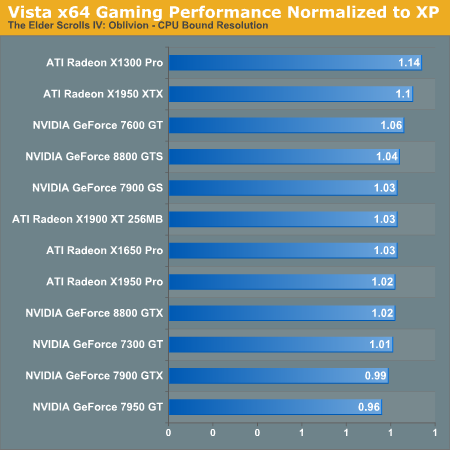
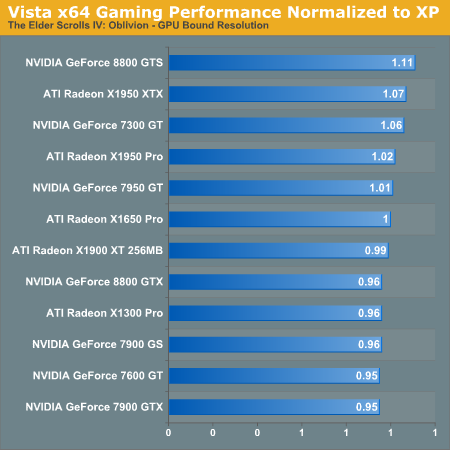
On the CPU limited results, most of the cards again run faster on Vista x64. This is frankly amazing, as even Microsoft expects performance to be slightly slower on Vista. In the GPU limited results, we see basically a random scattering of cards that are slightly slower or faster under Vista x64. Given that Oblivion is a 32-bit application running in WoW, we would be pretty happy with only small performance losses, and any performance improvements are unexpected but welcome. All in all, x64 performance looks good, and we haven't seen the types of compatibility and stability issues between the two that we did with XP x64.
Last up for Oblivion is resolution scaling.
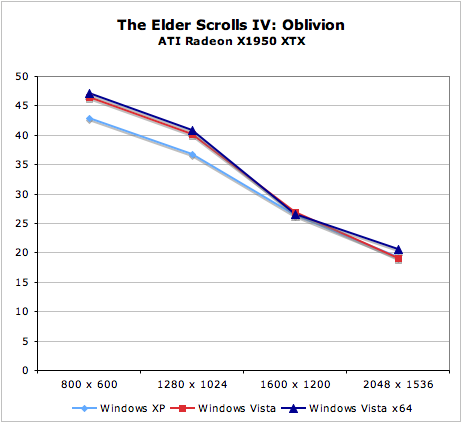
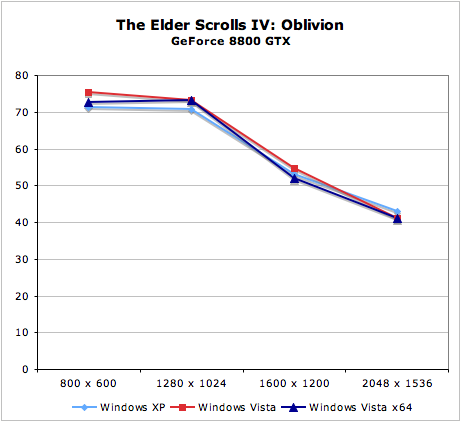
Both the 8800 GTX and X1950 XTX scale very similarly across platforms. There does seem to be more difference in CPU limited settings, while performance seems to converge as resolution increases.
There are an incredible number of tests we wanted to run in order to explore all the different aspects of gaming on Vista versus gaming on XP both in 32- and 64-bit modes. For this first look, however, we will be sticking with single card setups on Vista x86, Vista x64, and Windows XP x86. In the future, we plan on looking at multi-GPU performance as well as the performance of games on Windows XP x64. With Vista, Microsoft has improved the gaming on 64-bit landscape significantly, and we would like to see just how far we have come.
For now, we will be looking at a selection of cards from AMD and NVIDIA: five cards from the Radeon X1K series and five cards from the GeForce 7 series, as well as both current 8800 parts. These tests will look at GPU and CPU limited situations, and we will be comparing Vista x86 with Windows XP as well as Vista x64 to see where there are any differences. We will also look at resolution scaling on each of our three test operating systems, but only with two cards representing AMD and NVIDIA: the X1950 XTX and 8800 GTX.
In terms of APIs, one DirectX and one OpenGL game will be tested. Oblivion will represent the MS API, while Quake 4 will be showing off OpenGL performance on Vista. We have also taken a look at a native 64-bit game. Valve's Half-Life 2: Lost Coast will be run on all three operating systems in native mode. We would like to have compared HL2:LC running in WoW at 32-bit under x64, but we have not been able to figure out how to test it without running in 64-bit mode yet.
First up is Oblivion performance. DirectX performance should be as close as possible to Windows XP performance as this is Microsoft's baby. First, let's take a look at Vista x86 numbers divided by Windows XP scores for CPU limited and GPU limited cases. This will give us the speed up (numbers above one) or slow down (numbers less than one) as compared to Windows XP. Just remember that there is some normal fluctuation in performance on both sides, so we could see a wider margin of error here than in our standard comparisons.


For CPU bound tests, almost every card performs better under Windows Vista than under Windows XP; the lone exception is the X1900 XT 256MB. This indicates that Vista is better able to provide system resources to DirectX games, which is actually quite surprising considering the overhead that Vista adds to the system.
When we take a look at the GPU bound case, we see almost the opposite with only the 8800 GTS performing better than it does on Windows XP. This does line up with what we would expect. There is more involvement from the OS in the rendering pipeline and less direct access to the hardware by games. Vista is now able to manage graphics memory and graphics drivers must support sharing of hardware resources between multiple programs. Luckily, the differences aren't that huge. While the hardcore gamers won't be happy with any performance loss, Microsoft is betting that in the long term the advantages will outweigh the loss in framerate.
Now let's take a look at how Vista stacks up against XP in an x86 vs. x64 comparison


On the CPU limited results, most of the cards again run faster on Vista x64. This is frankly amazing, as even Microsoft expects performance to be slightly slower on Vista. In the GPU limited results, we see basically a random scattering of cards that are slightly slower or faster under Vista x64. Given that Oblivion is a 32-bit application running in WoW, we would be pretty happy with only small performance losses, and any performance improvements are unexpected but welcome. All in all, x64 performance looks good, and we haven't seen the types of compatibility and stability issues between the two that we did with XP x64.
Last up for Oblivion is resolution scaling.


Both the 8800 GTX and X1950 XTX scale very similarly across platforms. There does seem to be more difference in CPU limited settings, while performance seems to converge as resolution increases.










105 Comments
View All Comments
redpriest_ - Thursday, February 1, 2007 - link
Did you guys run the 64-bit tests solely on the Intel Conroe platform? Or did you test an AMD based platform as well? Recall that Conroe has a few performance enhancing features that *only* work in 32-bit mode (branch fusioning, for one - some decoder limitations as well).That could explain why a Core 2 Duo system might have seemed slower in 64-bit than in 32-bit mode.
Jeff7181 - Thursday, February 1, 2007 - link
SuperFetch is by far my favorite new feature of Vista. I put my first copy of Vista on my laptop, which has a 5400 RPM hard drive. Opening apps Outlook and VB .NET 2005 EE weren't really slow under XP, but there were those few extra seconds it took to load that would often leave me tapping my finger on the palm rest while I waited. Now under Vista, Outlook, VB .NET 2005 EE, and IE7 all seem to be able to fit in the SuperFetch cache, as they all open nearly instantly with just 1 GB of RAM. I'm considering upgrading to 2 GB just to see what else I can get to open really fast. :Dbldckstark - Thursday, February 1, 2007 - link
Was superfetch disabled when you tried the Readyboost feature in Vista? Whichever way you ran the test it bears mentioning. If it was off, then how does it do with it on? If it was on, it may make a difference in how it relates to XP.Also, as I understand it Vista has a system backup now that creates a "ghost" of the drive. Could you check out this feature and get back to us?
JarredWalton - Thursday, February 1, 2007 - link
I'm not sure it's possible to disable SuperFetch, so I'm pretty sure all testing was done with it on. As far as the "ghost" goes, that's part of System Restore which can be disabled quite easily. I'll have to let the other editors say whether it was enabled or not, though.WT - Thursday, February 1, 2007 - link
What drives me nuts are the plentiful comments about how slow Vista is compared to XP. I mean, anybody hear this before when MS came out with a new OS ? Same thing for XP,W2k,98 ... ad nauseum. Yea, its a new Operating System with more 'toys' built in, what were you expecting ? You aren't gonna load it on your P3/256 RAM rig and enjoy the Vista 'experience'. Damn, this thing runs better than XP on my rig !It's understood that it won't be as quick (keep in mind the OS has been available for retail purchase ... 2 days now) as XP, but drivers will improve that performance gap to a smaller number within 3 months time. I waited until just last year to upgrade to XP (W2K all the way for me !) but find myself with 2 copies of Vista and would prefer to dual boot one and go Vista all-out on the other one.
I griped back in my W2K days about being forced to upgrade due to content (MS games were announced that would only run in XP) so this time around I will be ready.
DX10? Marketing genius !!! We shall force an upgrade upon the masses !! I upgrade frequently, so DX10 and its graphical splendor is a priority, but if I would have to fork over $200 to actually buy Vista, I would be less than impresssed with DX10 eye candy.
EODetroit - Thursday, February 1, 2007 - link
Hopefully, now, finally, Anandtech will start testing motherboards for stability while loaded with the maximum amount of memory. So if the MB supposedly supports 8GB of RAM, you test it with that much, and make sure its stable. I've wanted this done for years... memory is expensive and it sucks to load a MB up and find out it doesn't really work or only works if you cut the speed in half.Thanks.
manno - Thursday, February 1, 2007 - link
... no mention of DRM then? No mention of Linux? Personally I hate Linux, but I've switched to it because of Vista's use of DRM. Not all Microsoft's fault, but they put it in there... My computer, my hardware, I choose what to do with it, not MS, not media companies. Why shouldn't I be able to watch High def content on my old, and once expensive non-HDMI LCD screen?Get a Mac, Apple is the lesser of 2 evils, they aren't the 800lb gorilla in the room. MS could have told media companies to stuff it. Apple has no choice, it's too small, yet their the ones that forced DRM-Light(TM) on the media companies. MS had the media companied force DRM-Oppressive(TM) on them... how the heck does that work?
I can't believe you left Linux out of the final comparison, is it as capable an OS, yes. Not nearly as user friendly, but it also has 0 DRM, doesn't phone-home isn't beholden to any one entity. I'm not against DRM, as a whole, just Vista's implementation. BS like MS creating D3D to subvert open standards like OpenGL, then removing it from the OS, using it's monopoly-based-ridiculous-margins(TM) to finance D3D's uptake, again rather than take an existing standard and expanding on it. They create their own to reinforce their monopoly. I know why they do this stuff I'm just peeved so many people don't give two flying f...
grr...
-manno
mlambert890 - Friday, February 2, 2007 - link
Youre insane dude.. No offense but there just isnt anything else to say. Posts like these always read like the transcript of a Weather Underground meeting in the sixties. "FIGHT THE POWER!!! FIGHT THE POWER!!!"Look out! The black helicopters have deployed from the underground helipad in Redmond and are circling!!! Send up the penguin symbol to summon the dynamic duo - Torvald and Stallman!
Reflex - Thursday, February 1, 2007 - link
There is no more or less DRM in Vista than in XP, or even OS X. The platform does not determine the playback of DRM'd media, the content does. The choice is simple: If you want to play back DRM'd media, then you have to support the decryption scheme that the media requires to decode it. In so doing you have to legally accept the limitations defined by that DRM scheme.It is no different for OS X, Linux, XP or any other OS. They either support the DRM schemes or they do not get to playback the media that uses them. This is why it is unlikely that you will be able to play DRM'd High Definition content anytime soon on Linux. That is the alternative, no support for the content at all.
Also, you can play high definition content on Vista just fine without HDMI/HDCP on your monitor. You simply cannot play back such content if it is coupled to a DRM scheme that requires HDCP, but that is true of every OS. Any other HD content will play back without issue.
Again, there is no difference between DRM on Vista from DRM on any other platform.
pmh - Thursday, February 1, 2007 - link
The DRM in vista is the major reason that I will only install it if physically forced to. Having bought a new Dell in order to get their very nice 24" LCD last december, I have an upgrade coupon which will lie unused until/unless the DRM can be disabled. MS refuses to display HD on my new monitor using Vista? Screw em.